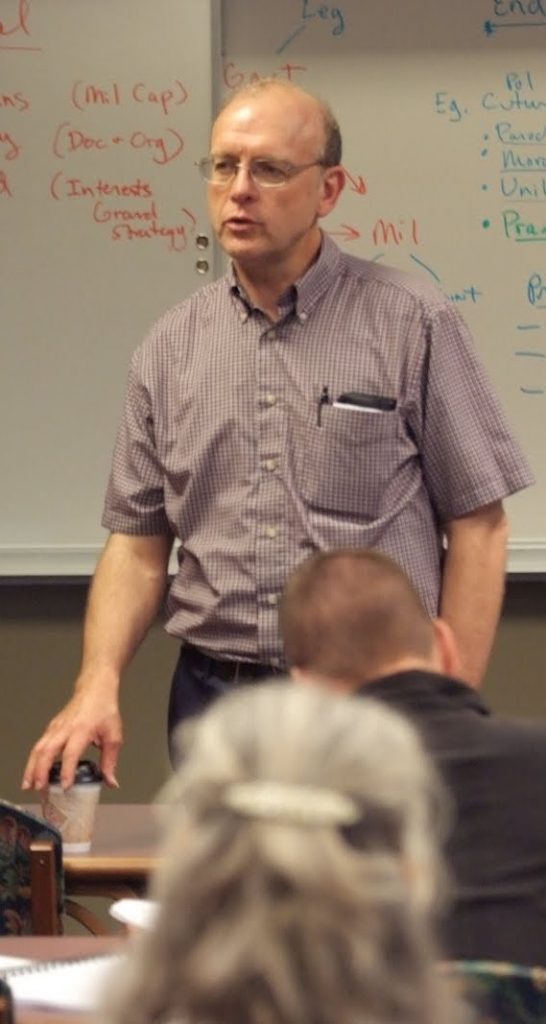David Tucker Joins Ashbrook as Senior Fellow
December 24, 2020

 David Tucker will join the Ashbrook Center as a Senior Fellow on February 1. He will research and write about civic education, religion in American history and politics, and civil liberties in an age of terrorism and cyber attacks. Tucker is an American historian, who has taught in the Department of Defense Analysis at the Naval Postgraduate School in Monterey, California since 1998. He has authored Enlightened Republicanism: A Study of Jefferson’s Notes on the State of Virginia as well as four books on military and strategic policy. Stanford University Press will publish his book this year, The End of Intelligence: Espionage and State Power in the Information Age.
David Tucker will join the Ashbrook Center as a Senior Fellow on February 1. He will research and write about civic education, religion in American history and politics, and civil liberties in an age of terrorism and cyber attacks. Tucker is an American historian, who has taught in the Department of Defense Analysis at the Naval Postgraduate School in Monterey, California since 1998. He has authored Enlightened Republicanism: A Study of Jefferson’s Notes on the State of Virginia as well as four books on military and strategic policy. Stanford University Press will publish his book this year, The End of Intelligence: Espionage and State Power in the Information Age.
“We look forward to the energy and thoughtfulness David will bring to our work,” said Ashbrook Director Roger Beckett. We asked Tucker to talk about his career shift and explain how he will contribute to Ashbrook’s effort to strengthen constitutional self-government.
You will study “civic education.” What role does civic education play in our national life?
We are a government of, for and by the people. If people don’t understand the principles of our government and how it works, how can the country be preserved?
In the present day, do you see civic education being neglected?
Research shows Americans are not learning how our government works or why it was set up as it was. As a remedy, some advocate a “service-learning” approach—getting young people involved in community projects. I don’t think that approach works. Our government is based on principles, not just blind action. If you put someone who doesn’t understand plants into a garden, telling them to tend it, you’ll get a mess. We need to teach the principles and practice of American government. This is the Ashbrook approach, and we do it through reading and discussing the primary documents of our history and politics. I hope to help explain why Ashbrook’s approach to civic education is the most effective.
After teaching and writing about US military policy, how do you come to be interested in civic education and religion in American history and politics?
I have taught in Ashbrook’s Master of Arts in American History and Government (MAHG) program since it began. The purpose of Ashbrook’s MAHG program is civic education.
One course I have taught for MAHG is “Religion in American History and Politics.” This interest grew out of my dissertation on Thomas Jefferson. While researching it, I noticed that Jefferson, the Deist, took religion and the religious character of his fellow Americans more seriously than did the historians of the Revolution and Founding whom I was reading. Religion has always been a powerful force in American politics.
How is that influence felt?
America’s tradition of religious freedom gives religion in the United States a dynamic energy and insures its relevance to individual Americans, whose faith often shapes not only their private choices but also their political choices. At the same time, religious freedom means that no particular faith exerts a direct influence on our governmental institutions. In America, politics and religion will always be intermingled in informal ways. Yet churches in America play a broad social role, since government here traditionally takes a narrow role. A range of social services, from food relief to education to medical care, are provided through faith communities.
You’ll also work on civil liberties. In a time of threats from terrorists and cyber-attackers, how do we find a balance between security and freedom?
Having spent much of my career on counter-terrorism policy, I understand the threat we face; but I also understand how bureaucracies work. As they pursue their missions, they accumulate power. Politicians and bureaucrats want to protect citizens from risk, and citizens appreciate that. But we have to ask, “What am I going to give up so I won’t be at risk?” In my opinion, this discussion has not been explicit enough.

